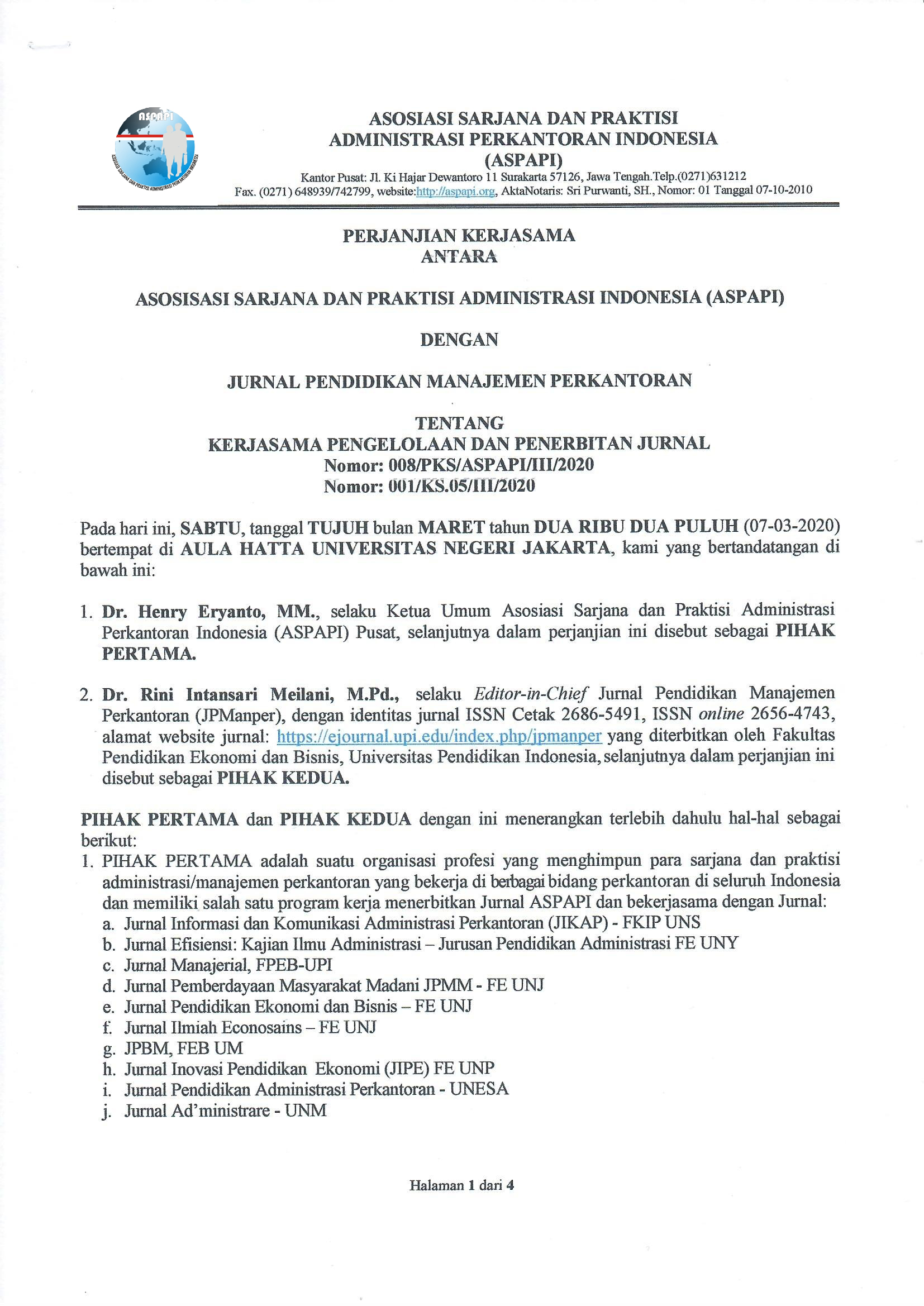Kontribusi mata pelajaran produktif dalam membangun kesiapan kerja siswa smk di Indonesia
Abstract
Learning process at the Vocational High Schools (SMK) in Indonesia is specifically intended to prepare their graduates to have necessary knowledge and skills in certain fields and appropriate attitudes to be ready to work immediately after graduation. This article discusses the results of a study aimed at finding out the extent of contribution of achievements on productive subjects provided during the learning process at Vocational Schools to the work readiness of 12th grade Vocational students in a State Vocational School in one of capital cities in Indonesia. By adopting quantitative research methods, data were collected by collecting 144 students ‘learning achievements in all productive subjects they had taken in five semesters of their study, and by distributing a set of questionnaires to find out the students' work readiness. The collected data were analyzed using descriptive and inferential statistics analyses. The results of data analyses showed that students’ achievements in productive subjects gave positive contribution to students’ work readiness. Holistic efforts involving all the elements involved in the learning process in school, which supports the development and mastery of students' knowledge, skills and positive mental attitudes must be carried out comprehensively so that they can achieve maximum achievement and have good work readiness and can work and develop professionally after they have completed their study at Vocational School.
ABSTRAK
Proses pembelajaran yang dilaksanakan di Sekolah Menengah Kejuruan (SMK) di Indonesia secara khusus ditujukan untuk mempersiapkan lulusannya untuk memiliki pengetahuan dan keterampilan pada bidang tertentu dan sikap yang berterima agar siap untuk bekerja setelah lulus. Artikel ini membahas hasil penelitian yang ditujukan untuk mengetahui seberapa besar kontribusi mata pelajaran produktif yang diberikan selama proses pembelajaran di SMK terhadap kesiapan kerja para siswa SMK kelas 12 di sebuah SMK Negeri di salah satu kota besar di Indonesia. Dengan mengadopsi metode penelitian kuantitatif, data dikumpulkan dengan menganalisa hasil belajar 144 siswa dalam semua mata pelajaran produktif yang dipelajari dalam lima semester, serta dengan menyebarkan angket untuk mengukur kesiapan kerja para siswa. Data yang dikumpulkan dianalisa secara deskriptif dan inferensial. Hasil analisis data menunjukan bahwa prestasi siswa pada mata pelajaran produktif memberikan kontibusi yang positif terhadap kesiapan kerja siswa. Usaha holistik yang melibatkan semua elemen yang terkait dalam proses pembelajaran di sekolah, yang mendukung pengembangan dan penguasaan pengetahuan, keterampilan dan sikap mental positif para siswa harus dilakukan secara komprehensif sehingga mereka dapat mencapai prestasi yang maksimal dan memiliki kesiapan kerja yang matang dan dapat bekerja serta berkembang secara profesional setelah mereka menyelesaikan masa studi nya di SMK.
Keywords
Full Text:
PDFReferences
Affafa, R. G., Efendi, A., & Basori. (2017). The Influence of Achievement Subject Package of Expertise (C3), Learning Motivation and Industrial Guidance Toward Achievement of Industrial Working Practice Multimedia Student at State Vocational High School 3 Surakarta. Indonesian Journal of Informatics Education.
Anandita, A. (2011). Pengaruh Cara Belajar dan Keterampilan Mengajar Guru Terhadap Prestasi Belajar Mata Pelajaran Kearsipan. Jurnal Pendidikan, 92-93.
Dina, Jennah, H. A., & Septiwiharti, D. (2016). Meningkatkan Motivasi Siswa Mengemukakan Pendapat. Jurnal Pendidikan, 7-10.
Dinata, M. R. (2016). Peran Konsep Diri dan Kesiapan Kerja Terhadap Kecemasan Mahasiswa Tingkat Akhir dalam Menghadapi Dunia Kerja. Jurnal Pendidikan, 4-5.
Dyachenko.M.L., & Kandybovich.L.A. (1976). Psychological problem of readiness for activity. Minsk: Publishing house of BGU, 176.
Huda, N. (2015). Pengaruh Mata Pelajaran Produktif, Praktik Kerja Industri dan Keadaan Ekonomi Keluarga Terhadap Kesiapan Kerja Siswa. Unnes Skripsi, 27-28.
Jannah, U. M., Suswanto, H., & Handayani, A. N. (2016). Vocational High School Student’s Readiness to Work in Internet Service Provider Enterprise: Based on Mastery Vocational Competence, Internship and Job Interest. American Institute of Physics.
Komarudin, Sutadji, E & Suhartadi, S. (2018). Contribution of Teaching Factory, Basic Knowledge, And Self Efficacy to Vocational Competence and Its Impact to Work Readiness. International Journal of Novel Research in Education and Learning, Vol. 5, Issue 1, pp: (1-7)
Krisnamurti, T. F. (2016). Faktor-Faktor yang Mempengaruhi Kesiapan Kerja Siswa Kelas XII. Jurnal Pendidikan, 33.
Kusumastuti, F. (2018). The Influence Of On The Job Training, Productive Subject Achievement, Social Environment And Motivation To Work Toward The Readiness Of Entering Job Market Of Student Class Xii Accounting Smkn 2 Magelang Academic Year 2017/2018. Education Journal, Yogyakarta State University.
Margunani, R. M. (2014). Pengaruh Praktik Kerja Industri (PRAKERIN), Penguasaan Mata Diklat Produktif Akuntansi dan Minat Kerja Siswa terhadap Kesiapan Menghadapi Dunia Kerja Siswa SMK Program Keahlian Akuntansi di SMKN 1 Salatiga. Economic Education Analysis Journal, 328-329.
Marniati & Wibawa, S. C. (2018). The impact of fashion competence and achievement motivation toward college student’s working readiness on “Cipta Karya” subject. The Consortium of Asia-Pacific Education Universities (CAPEU), 296.
Muktiani, E. E. (2014). Pengaruh Praktek Kerja Industri dan Prestasi Akademik. Journal.unnes.ac.id, 170-172.
Shadow, J. (2018). Work-Readiness Impact of JA Program Participation. Education Journal ExecSum.
Smith, C. D., Russell, L., & Ferms, S. (2014). Assessing the impact of WIL on student work-readiness. Australian Government, 69.
Wardani, E. S., Isnandar, & Sendari, S. (2017). The Influence of Employability Skills and Skill Competency toward Work Readiness. Advances in Social Science, Education and Humanities Research.
Wilson, L.O. (2016). The Three Domains of Learning: Cognitive, Affective, and Psycomotor/Kinesthetic. Retrieved from http://thesecondprinciple.com/wp-content/uploads/2016/10/The-Three-domains-of-learning-10-2016.pdf
DOI: https://doi.org/10.17509/jpm.v4i1.14960
Refbacks
- There are currently no refbacks.
Copyright (c) 2019 Jurnal Pendidikan Manajemen Perkantoran
Jurnal Pendidikan Manajemen Perkantoran View My Stats



